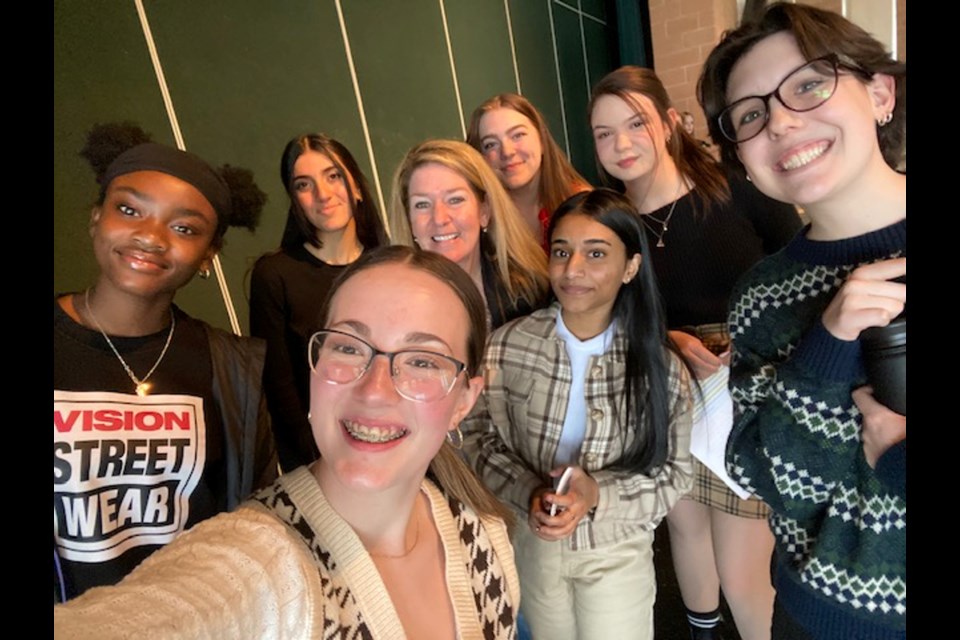Students from Nantyr Shores Secondary School returned to the stage last week for their first in-person public speaking competition since 2019.
This year there were seven competitors and eight classes who took part in the event, with Samantha Brine crowned the Junior Champion for her speech on sexism and the double standard and Deborah Olowe taking the title of Senior Champion for her speech on racial stereotyping.
English and philosophy teacher Dr. Jennifer McGrath, who founded the competition, serves as the public speaking coach at the school.
“I work with each competitor through every piece of the process—from topic planning to outlines to editing to rehearsals to get them as prepared as they can be for the competition,” said McGrath. “The focus is on words and voice. It’s a classic craft and it’s being done in a very traditional way.”
In 2019, the Innisfil high school held its inaugural public speaking competition, but thanks to the pandemic, had to miss it altogether in 2020 and have it held virtually in 2021. The event returned in person on May 5.
“The feedback from the students was so good, they all felt good win or lose,” said McGrath. “Each student was talking about an issue important to them and that to me is the biggest takeaway. These young people aren’t necessarily talking about what you think they’d be talking about. They’re talking about genocide, racial stereotyping, and sexism. These are very passionate, compelling, thought-provoking topics. They do a lot of research but ultimately are choosing something they care about and that’s the most important thing. The classes and staff were really impressed with the level of intellectual curiosity from the students.”
The competition was split into divisions —Junior for Grade 9 and 10 and Senior for Grade 11 and 12—and three judges made up the panel using the Canadian National Public Speaking Competition scorecard.
“With my long-term vision of getting our students onto the next level, I thought let’s start them out with the same standards as provincial or national level competitors,” McGrath explained. “The judges use those scorecards to assess not just the delivery but also use of body language, eye contact, clarity and differentiation of voice, as well as the organization of your messaging, how well researched it is, how timely or relevant it is. It’s the whole package. Each student has three to five minutes of entirely original work, unless they give proper citations, and it’s just them behind a mic with cue cards.”
Launching the public speaking competition from scratch at the school, McGrath wasn’t certain how it would go, but she’s proud of how successful it has been.
“I started with a sales pitch on morning announcements over three and a half years ago and said, ‘Do your friends know that you love to share your opinion? Do you have an issue that you’ve been thinking a lot about and want to share with others?’ I really tried to reach the students where they were, but I also had to emphasize that while some might be naturals, but for the vast majority of us it’s a skill that has to be practiced and refined over time," said McGrath.
McGrath is hopeful more schools begin to hold competitions so that the students can go on to face more competitors.
“Public speaking at the high school level really doesn’t appear to be a thing in our school board,” she said. “I’m not currently aware of other schools doing it, although I’m hoping they are because the bigger plan, once we got our competition up and running after a few iterations, is we would love to see the students go on to compete at another level.”
As a teacher, McGrath has seen firsthand how mindful students are of controversial topics, and that’s why it doesn’t surprise her to see the public speaking competitors focusing on them.
“The speech competition was not a stretch for me as a teacher because in my classroom I’ve worked really hard to try and create a setting where we engage in transformative dialogue,” she said. “Where we talk about hefty topics and some of the skills we’re learning is how to listen when you don’t agree, how to ask questions when you don’t understand, and how to communicate your beliefs from a professional standpoint.”
McGrath sees the public speaking competition as a complex skill-building exercise for the students that allows them both to learn and show how much they care about important topics.
“We have ideas about whether or not teenagers are civically or globally aware, but they are. They have more access to information than teen generations before them and they’ve been stereotyped as not being informed. They’re not as intellectually mature yet but they want to ask questions and want to learn more, and they’re passionate about these topics. The kids are just so impressive. Our kids are doing purposeful and important work.”



